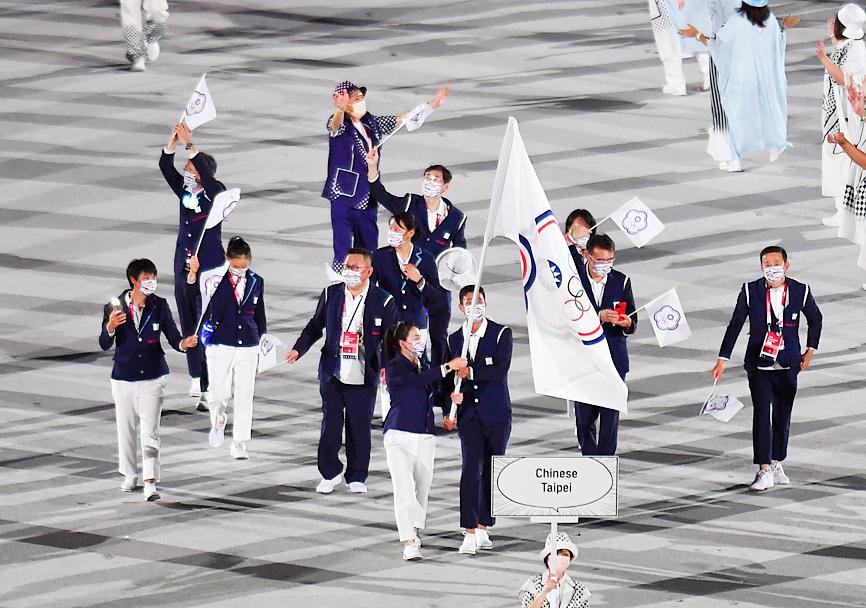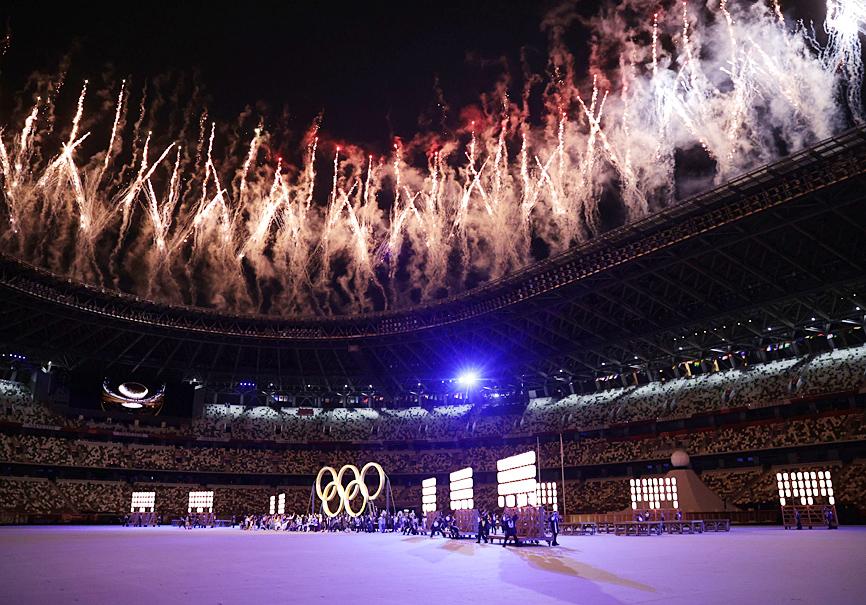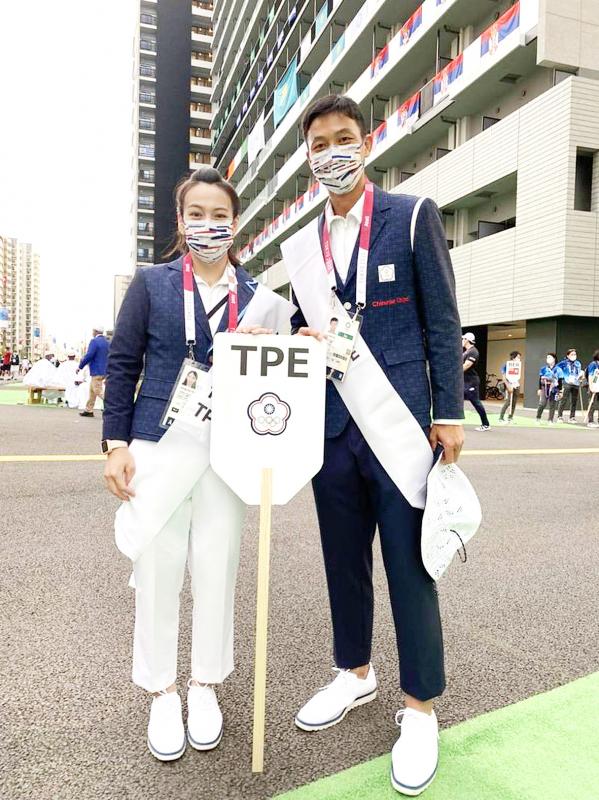The opening ceremony of the Tokyo Olympics took place yesterday in a nearly empty stadium after a year-long COVID-19-pandemic postponement and a build-up marred by scandal and controversy.
The stripped-back celebration began with a video showing athletes training at home during the pandemic, before fireworks burst into the air above the Olympic Stadium.
Just a few hundred officials and dignitaries were in the stands of the 68,000-seat venue, including French President Emmanuel Macron, US first lady Jill Biden and Japanese Emperor Naruhito, who would declare the Games open.

Photo: Lin Cheng-kung, Taipei Times
The Olympics have faced opposition in Japan over fears the global gathering of 11,000 athletes could trigger a super-spreader event, and is taking place under strict virus measures.
Overseas fans are banned for the first time in the history of the Games, and domestic spectators can only watch events at a handful of venues.
Athletes, support staff and media are subject to strict COVID-19 protocols, including regular testing and daily health checks. The restrictions made for an opening ceremony that was far from the usual exuberant celebration.

Photo: Reuters
Every athlete entered the stadium wearing a mask, and the national delegations of athletes marching around the stadium were far smaller than usual, ranging from just a handful of people to a few dozen.
The ceremony wove together references to Japan’s traditional crafts and its globally adored video games, with athletes entering to theme music from famed titles.
Polls have consistently shown that Japanese are opposed to holding the Games during the pandemic, but hundreds of people still gathered outside the stadium and cheered as the fireworks exploded overhead.

Photo courtesy of the Chinese Taipei Olympic Committee
Mako Fukuhara arrived six hours before the ceremony to grab a spot.
“Until now it didn’t feel like the Olympics, but now we are by the stadium, it feels like the Olympics,” she said as people snapped selfies nearby.
Inside, fewer than 1,000 dignitaries and officials were in the stands, and in a sign of how divisive the Games remain, several top sponsors including Toyota and Panasonic did not attend the ceremony.
Small groups of protesters demonstrated against the Games outside the stadium as the ceremony began, but their chants were drowned out as the music started.
Tokyo is battling a surge in virus cases, and is under emergency measures that mean bars and restaurants must shut by 8pm and cannot sell alcohol.
Olympic officials have put a brave face on the unusual circumstances, with International Olympic Committee (IOC) president Thomas Bach insisting that canceling the Games was never on the table.
“Over the past 15 months we had to take many decisions on very uncertain grounds,” he said this week. “We had doubts every day. There were sleepless nights.”
“We can finally see at the end of the dark tunnel. Cancelation was never an option for us,” he said. “The IOC never abandons the athletes ... we did it for the athletes.”

CHAOS: Iranians took to the streets playing celebratory music after reports of Khamenei’s death on Saturday, while mourners also gathered in Tehran yesterday Iranian Supreme Leader Ayatollah Ali Khamenei was killed in a major attack on Iran launched by Israel and the US, throwing the future of the Islamic republic into doubt and raising the risk of regional instability. Iranian state television and the state-run IRNA news agency announced the 86-year-old’s death early yesterday. US President Donald Trump said it gave Iranians their “greatest chance” to “take back” their country. The announcements came after a joint US and Israeli aerial bombardment that targeted Iranian military and governmental sites. Trump said the “heavy and pinpoint bombing” would continue through the week or as long

TRUST: The KMT said it respected the US’ timing and considerations, and hoped it would continue to honor its commitments to helping Taiwan bolster its defenses and deterrence US President Donald Trump is delaying a multibillion-dollar arms sale to Taiwan to ensure his visit to Beijing is successful, a New York Times report said. The weapons sales package has stalled in the US Department of State, the report said, citing US officials it did not identify. The White House has told agencies not to push forward ahead of Trump’s meeting with Chinese President Xi Jinping (習近平), it said. The two last month held a phone call to discuss trade and geopolitical flashpoints ahead of the summit. Xi raised the Taiwan issue and urged the US to handle arms sales to

BIG SPENDERS: Foreign investors bought the most Taiwan equities since 2005, signaling confidence that an AI boom would continue to benefit chipmakers Taiwan Semiconductor Manufacturing Co’s (TSMC, 台積電) market capitalization swelled to US$2 trillion for the first time following a 4.25 percent rally in its American depositary receipts (ADR) overnight, putting the world’s biggest contract chipmaker sixth on the list of the world’s biggest companies by market capitalization, just behind Amazon.com Inc. The site CompaniesMarketcap.com ranked TSMC ahead of Saudi Aramco and Meta Platforms Inc. The Taiwanese company’s ADRs on Tuesday surged to US$385.75 on the New York Stock Exchange, as strong demand for artificial intelligence (AI) applications led to chip supply constraints and boost revenue growth to record-breaking levels. Each TSMC ADR represents

State-run CPC Corp, Taiwan (CPC, 台灣中油) yesterday said that it had confirmed on Saturday night with its liquefied natural gas (LNG) and crude oil suppliers that shipments are proceeding as scheduled and that domestic supplies remain unaffected. The CPC yesterday announced the gasoline and diesel prices will rise by NT$0.2 and NT$0.4 per liter, respectively, starting Monday, citing Middle East tensions and blizzards in the eastern United States. CPC also iterated it has been reducing the proportion of crude oil imports from the Middle East and diversifying its supply sources in the past few years in response to geopolitical risks, expanding